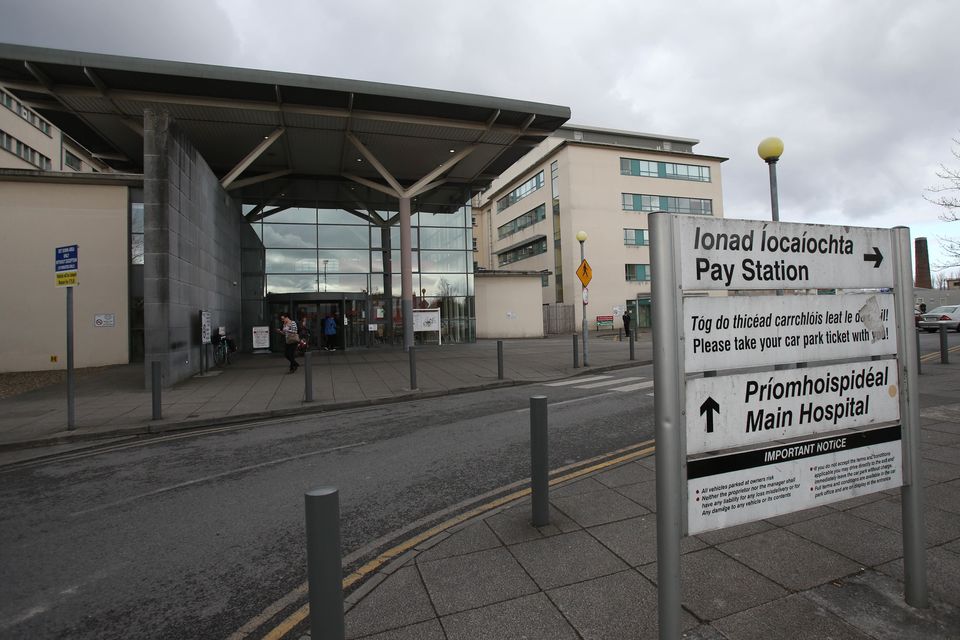Woman waited 12 hours for emergency surgery for ectopic pregnancy in Galway hospital, Dáil told
University Hospital Galway. Photo: PA
Another hospital emergency department story has shocked the Dáil, a week after the Aoife Johnston inquest.
A woman, named Niamh, waited 12 hours for an emergency operation for an ectopic pregnancy after she turned up at University Hospital Galway.
She considered herself lucky to be alive, the Tánaiste was told by Galway West TD Mairéad Farrell.
The woman was in agony when she presented to an emergency unit that was clearly too busy, the Sinn Féin deputy said.
"She provided a urine sample which she was asked to leave on a cart for collection. Two hours later, she noticed that it was still lying there, and Niamh broke down crying,” Ms Farrell said.
"She asked the nurse why her sample was still sitting there and what was happening with her blood tests, and her questions were met with confusion.
"When results came back showing elevated white cells and a suspected infection. She was prescribed an antibiotic and a pain drug.
"As it was being administered, the nurse came rushing back in panic and shouted, 'You are pregnant! You can't be on this painkiller while pregnant'. And then panic ensued about how much she had been given.”
Niamh was finally referred to gynaecologist almost seven hours after admission "and it was only then that the possibility of an ectopic pregnancy was raised”, Ms Farrell said.
"It was determined that Niamh needed an emergency scan, which he didn't get until 2.30pm, eight-and-a-half hours after coming in.
"The scan showed nothing but blood in her uterus and Niamh's emergency surgery wouldn't happen until 6.45pm, 12 hours after she first presented."
Her partner was told surgery would take one-and-a-half hours, but the operation took over three hours due to significant internal bleeding.
"Sometimes Niamh can't believe she survived," Ms Farrell said.
"She kept thinking, ‘What's going to happen to my baby so if I don't survive?’ It was deeply traumatising.
"She told me they weren't even able to handle the amount of people at 6am: 'I'm lucky I went in early in the morning. If I'd gone later, I don't know if I'd still be here’."
The hospital was clearly understaffed and the workers run off their feet, Ms Farrell said.
There were not enough beds. She called on the Government to end the recruitment embargo and to deliver the 1,500 beds "that our hospitals need".
She said Niamh had wanted her to give Government the message that "people are dying needlessly in our emergency departments. I could have been one of them. We need change”.
In reply, Micheál Martin said he did not know of the case, but it was clear that Niamh "went through an extraordinary traumatic and horrific journey from arrival to the emergency department and subsequent developments and treatment".
The Tánaiste said however he was "mystified" by the HSE recruitment embargo being raised when it did not apply to consultants and a total of 28,000 people have been recruited to the Health Service since 2020.
"There comes a time when you have to look at other factors," he said.
Today's News in 90 seconds - 2nd May 2024
Mr Martin questioned the organisation at Galway University Hospital is such cases could arise.
It raised issues for him that were not about resources, he said, and were not about the recruitment embargo.
Last month a coroner recorded a verdict of medical misadventure after hearing how Aoife Johnston (16) of Shannon, Co Clare, died at University Hospital Limerick on December 19, 2022.
She had turned up with suspected sepsis at UHL’s chaotically overcrowded A&E and died after waiting 15 hours and 15 minutes for the antibiotics that would have saved her life.
A spokesperson for University Hospital Galway said: “Patient safety is at the forefront of everything we do and we regret that any patient has a bad experience while waiting to access our services, including those who have to wait in the Emergency Department beyond an acceptable timeframe.
“When a client or family makes personal information public, this does not relieve the HSE of its duty to preserve/uphold client confidentiality at all times.
“A member of this patient’s clinical team however would be happy to discuss any aspect of care directly with them or their family members, we are available to liaise directly with the patient or their family on any issues of concern.”
Read more
Join the Irish Independent WhatsApp channel
Stay up to date with all the latest news














